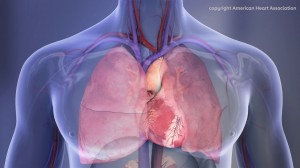Heart stenting relieved chest pain and improved exercise capacity
 The ORBITA-2 trial provides the first robust data confirming that stenting, also called percutaneous coronary intervention (PCI), relieves stable chest pain and improves exercise capacity among patients taking little or no chest pain medication, according to late-breaking science presented today at the American Heart Association’s Scientific Sessions 2023. The meeting, Nov. 11-13, in Philadelphia, is a premier global exchange of the latest scientific advancements, research and evidence-based clinical practice updates in cardiovascular science.
The ORBITA-2 trial provides the first robust data confirming that stenting, also called percutaneous coronary intervention (PCI), relieves stable chest pain and improves exercise capacity among patients taking little or no chest pain medication, according to late-breaking science presented today at the American Heart Association’s Scientific Sessions 2023. The meeting, Nov. 11-13, in Philadelphia, is a premier global exchange of the latest scientific advancements, research and evidence-based clinical practice updates in cardiovascular science.
Medication is proven to treat pain caused by reduced blood flow to the heart triggered by exertion, exposure to cold, emotional stress and other events, commonly referred to as stable angina or stable chest pain. When medication is insufficient, stenting procedures are recommended.
The only previous blinded trial examining whether stenting relieves chest pain, ORBITA published in 2017, surprisingly showed that stenting did not improve exercise tolerance or chest pain any more than a placebo procedure. It proved the feasibility of conducting placebo-controlled trials of established interventional procedures and made it possible to design subsequent research applied to a wider population of patients and clinical practice.
“However, it is possible that the effect of stenting in ORBITA was diminished by high levels of guideline-directed background, antianginal medication, which are difficult to achieve in clinical practice,” said Rasha Al-Lamee, M.B.B.S., Ph.D., reader (equivalent to associate professor) in cardiology, a British Heart Foundation intermediate research fellow and an interventional cardiology consultant at Imperial College London and Imperial College Healthcare NHS Trust.
ORBITA-2 enrolled a broader range of 301 patients with both single and multivessel disease who were randomly assigned to either coronary stenting or a placebo procedure. Neither patients nor the medical or research teams were aware of which procedure they had received. Throughout the trial, patients reported whether they were experiencing chest pain every day using a dedicated smartphone application. These daily symptom reports and the need for chest pain medication were used to calculate the angina symptom score, which is a first-of-its-kind primary study endpoint.
“We calculated an ‘angina symptom score’ daily for each participant based mainly on how much chest pain they experienced and their need for antianginal medication. We found that stents improved symptoms compared to the placebo procedure,” Al-Lamee said.
The study found:
- Patients who had stents were 3-times more likely to be free from angina at the end of the trial compared to patients who had the placebo procedure. Stenting improved the angina symptom score, with follow-up scores of 2.9 in the PCI group and 5.6 in the placebo group.
- Exercise time increased by 60 seconds more among patients who received stenting compared to patients who received the placebo procedure.
- The effect of stenting was immediate and sustained during the 12-week follow-up period.
Study Background:
- Participants were taken off their background chest pain medication before they were randomly assigned to one of the two treatment groups.
- Chest pain medication was restarted if the patient contacted the blinded research team to report symptoms. Medication restarts and dose increases were managed by blinded trial researchers who did not know whether the patient had received a stent or placebo procedure and who followed a specific trial protocol.
- The trial was conducted in 14 centers in the United Kingdom.
- 79% of participants were men, and the average age was 64 years.
- Study participants also had other health conditions, including hypertension (63%), Type 2 diabetes (28%) and high cholesterol (72%).
- There were no deaths in the trial, although heart attacks occurred in four patients in the stenting group and six patients in the placebo group.
“We expected that PCI would be more effective than a placebo procedure in patients taking little or no chest pain medication, and indeed, the results proved our hypothesis was correct,” Al-Lamee said. “Going forward, patients and medical teams have a choice of two pathways for chest pain relief: chest pain medication or PCI. The key finding of this trial is that it is the first therapy initiated that seems to have the maximum effect. Although PCI is neither risk-free nor cost-free, its use as an upfront procedure can now be considered evidence-based.”
“The ORBITA and ORBITA-2 trials together suggest the American and European guidelines for stable coronary artery disease may require updating. Perhaps restricting stenting to patients with inadequate response to chest pain medications may inadvertently be selecting the group of patients with the least to gain,” Al-Lamee said.
However, she said there are several reasons the findings should be interpreted cautiously:
- PCI only provided a 60-second improvement in exercise time. This is a smaller effect than many cardiologists would have believed from unblinded data, and similar to the effect of one full-dose antianginal medication.
- PCI is not universally effective. In this study, 59% of patients who received stents continued to experience chest pain even after a successful procedure and near-normalization of the blood supply to the heart.
Finally, Al-Lamee said, “I hope that the two trials will be used together to give patients and medical teams the choice of two treatment strategies with similar levels of benefit. They each have their own benefits, risks and limitations that should form part of the decision-making process. Importantly, the first therapy administered, antianginal medication or PCI as an antianginal procedure, appears to deliver most of the available symptomatic response.”
The study will be presented by today by Christopher Rajkumar, M.B.B.S., M.R.C.P., a clinical research fellow at Imperial College London, with simultaneous publication in The New England Journal of Medicine. Other co-authors, disclosures and funding sources are listed in the abstract.
Statements and conclusions of studies that are presented at the American Heart Association’s scientific meetings are solely those of the study authors and do not necessarily reflect the Association’s policy or position. The Association makes no representation or guarantee as to their accuracy or reliability. Abstracts presented at the Association’s scientific meetings are not peer-reviewed, rather, they are curated by independent review panels and are considered based on the potential to add to the diversity of scientific issues and views discussed at the meeting. The findings are considered preliminary until published as a full manuscript in a peer-reviewed scientific journal.
The Association receives funding primarily from individuals; foundations and corporations (including pharmaceutical, device manufacturers and other companies) also make donations and fund specific Association programs and events. The Association has strict policies to prevent these relationships from influencing the science content. Revenues from pharmaceutical and biotech companies, device manufacturers and health insurance providers and the Association’s overall financial information are available here.
Additional Resources:
- Multimedia is available on the right column of the release link https://newsroom.heart.org/news/heart-stenting-relieved-chest-pain-and-improved-exercise-capacity?preview=fa0270ccd7d7976108caa8baa1993162
- After Nov. 11, view the abstract in the AHA Scientific Sessions 2023 Online Program Planner
- AHA news release: Experiencing pain after a heart attack may predict long-term survival (August 2023)
- About Scientific Sessions 2023
- For more news at AHA Scientific Sessions 2023, follow us on X (formerly Twitter) @HeartNews,#AHA23
About the American Heart Association
The American Heart Association is a relentless force for a world of longer, healthier lives. We are dedicated to ensuring equitable health in all communities. Through collaboration with numerous organizations, and powered by millions of volunteers, we fund innovative research, advocate for the public’s health and share lifesaving resources. The Dallas-based organization has been a leading source of health information for nearly a century. Connect with us on heart.org, Facebook, X or by calling 1-800-AHA-USA1.
Short URL: https://caninechronicle.com/?p=276190
Comments are closed












